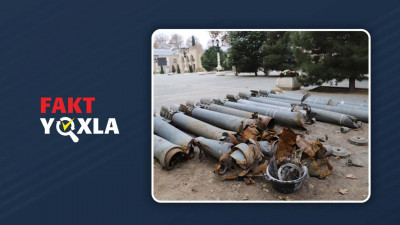Speaking about the Environmental Protection First (EPF) Coalition created by local non-governmental organizations in connection with environmental violations in the mining industry of Armenia, MP Nagif Hamzayev said that international organizations are silent about environmental crimes that occur in Azerbaijan or nearby areas.
But have international organizations remained silent on environmental problems for which Armenia is responsible?
The report of the Asian Development Bank (ADB) published in 2005 on environmental issues in Azerbaijan indicated the loss of the Nagorno-Karabakh territory as one of the factors affecting the increase in land degradation in Azerbaijan (page XI). ADB stated that the level of discharges of heavy metals and other pollutants into the Kura and Aras, which are 2 main rivers passing through Azerbaijan, in Georgia and Armenia is a subject given much prominence in Azerbaijan and rightly considered a topic of major geopolitical and public health significance (page XII).
The organization pointed to the displacement of 750,000 people as a result of the conflict with Armenia as a factor that aggravates the poverty-related difficulties of the population of Azerbaijan and said that this created the basis for environmental problems (p. 4). "... Emergencies related to refugees often turn into more persistent environmental and health problems...", the report states. (p. 4, 5, 23)
- In 2016, PACE adopted Resolution No. 2085 on deliberate deprivation of water to residents of border regions of Azerbaijan. Paragraph 4 of the Resolution states that the Assembly deplores the fact that the occupation by Armenia of Nagorno-Karabakh and other adjacent areas of Azerbaijan creates similar humanitarian and environmental problems for the citizens of Azerbaijan living in the Lower Karabakh valley. The Resolution also states that the deliberate creation of an artificial environmental crisis must be regarded as “environmental aggression” and seen as a hostile act by one State towards another aimed at creating environmental disaster areas and making normal life impossible for the population concerned.
Article 6, which is about the environmental and humanitarian disaster that may arise in connection with the Sarsang reservoir, states that the lack of regular maintenance work for over twenty years on the Sarsang reservoir, located in one of the areas of Azerbaijan occupied by Armenia, poses a danger to the whole border region. The Assembly emphasises that the state of disrepair of the Sarsang dam could result in a major disaster with great loss of human life and possibly a fresh humanitarian crisis. In the end the immediate withdrawal of Armenian armed forces from the occupied territories and the elimination of the problem.
In 2011, the Secretariat of the Aarhus Convention, which is the environmental division of the UN Economic Commission for Europe, issued a statement protesting the cutting of thousands of trees in the Sunik area of Armenia. It was noted that the Sunik district ranks first in Armenia in terms of pollution. It was reported that the area's water, forest, and land resources were polluted with the waste of large mining enterprises, creating a catastrophic ecological situation.
Regarding the Metsamor NPP, which is often on the agenda in the media and among the public, the European Union has appealed to Armenia several times and said to stop the operation of the NPP. The closure and decommissioning of Metsamor NPP was mentioned in Article 42 of the partnership agreement concluded between Armenia and the European Union in 2017 and covering various fields.
Thus, international organizations did not exclude Armenia when making announcements and statements about environmental problems. In other words, it became known that there are statements and resolutions of international organizations regarding environmental problems arising from Armenia both within the country and in the region.
Fakt Yoxla concludes that the claim of the deputy is False.











